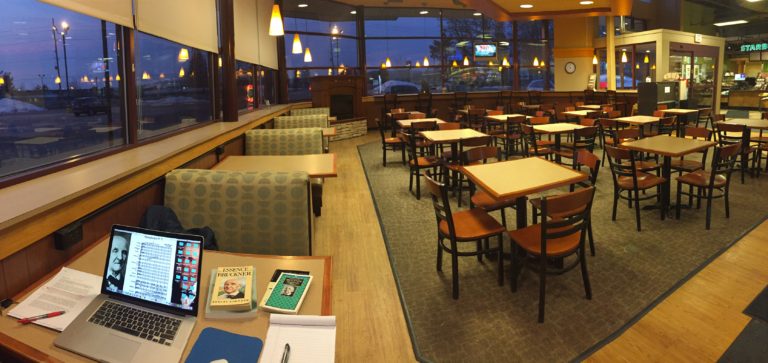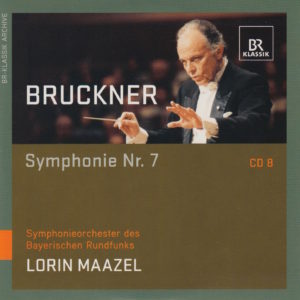
My listening space this morning – back at the grocery store. I love getting here before anyone else does and watching the sun rise. Makes me feel all productive and sly.
 This morning’s conductor of Anton Bruckner’s Symphony No. 7 in E Major (WAB 107) is American Lorin Maazel (1930-2014).
This morning’s conductor of Anton Bruckner’s Symphony No. 7 in E Major (WAB 107) is American Lorin Maazel (1930-2014).
I first encountered Maestro Maazel on Day 9 in my 144-day project.
On that day, he interpreted Bruckner’s First.
Then again on Day 25, Symphony No. 2.
Then again on Day 41, Symphony No. 3.
Then again on Day 57, Symphony No. 4.
Then again on Day 73, Symphony No. 5.
And, most recently, on Day 89, Symphony No. 6.
To say that I have not, as a general rule, enjoyed Mr. Maazel’s interpretations is to understate the matter.
But, to precisely state the matter, here are the facts:
 Bruckner’s Symphony No. 7 in E Major (WAB 107) composed 1881-1883
Bruckner’s Symphony No. 7 in E Major (WAB 107) composed 1881-1883
Lorin Maazel conducts
Maazel used the “Edition L. Nowak,” according to the CD sleeve
Symphonieorchester des Bayerischen Rundfunks plays
The symphony clocks in at 66:39
This was recorded in Munich, Germany, on March 13, 1999
Maazel was 69 when he conducted it
Bruckner was 59 when he composed it
This recording was released on the BR Klassic label
Bruckner wrote his symphonies in four parts. The time breakdown of this one (Symphony No. 7 in E Major [WAB 107], “Edition L. Nowak”), from this particular conductor (Maazel) and this particular orchestra (Symphonieorchester des Bayerischen Rundfunks) is as follows:
I. Allegro moderato…………………………………………………………………………21:05
II. Adagio. Sehr feierlich und sehr langsam…………………………………..25:54
III. Scherzo. Sehr schnell………………………………………………………………..10:02
IV. Finale. Bewegt, doch nicht schnell……………………………………………12:25
Total running time: 66:39
Much to my surprise, previous conductors turned in performances of Bruckner’s Seventh that ran longer. Often, it is Maazel’s interpretations that are among the longest. This time, however, he was right about in the middle, with both Jochum interpretations (“White Box” and “Green Box”) lengthier by a good one to three minutes.
Now, the subjective aspects.
My Rating:
Recording quality: 4
Overall musicianship: 3
CD liner notes: 3 (short – but interesting – essays on Bruckner, Maazel, and the orchestra, translated into German and English; however, virtually nothing about the recordings – like when? where? what year? some of that information is on the CD sleeve)
How does this make me feel: 3
This is another remarkably average recording. It’s not good. It’s not bad. It’s just not electrifying.
I listened to this performance twice through.
At no time did I sit up and and think, “Wow. That was amazing!”
However, I will say I enjoyed Movement I more in Maazel’s interpretation than in previous ones from other conductors. It seemed to ebb and flow with greater clarity and energy. I was intrigued by it.
This time, the applause that ends the live performance was brief, which I wholeheartedly appreciate. For some reason applause at the end of a performance only calls attention to it as being a recorded performance. It takes me out of the magic of it. And it’s rare for me to think it’s a deserved applause, which takes me even farther out of it.
Overall, Maazel’s interpretation of Bruckner’s Seventh is solid, if not essential. If I only had this to listen to, I’d probably do it. But I’d do so grudgingly, knowing there are better performances out there.
